#The ancient greek earth goddess I mean
Explore tagged Tumblr posts
Text
Here's a problem.
After posting this, I caught myself overthinking how many notes it's getting in relation to the other posts about this fic I've made. And that's one worrying sign about my motivation on writing this. The other is how this didn't really help me flesh out Minos' role in this fic. In actuality, it was an attempt at writing when the one thing that kept being on my mind was why Minos was still a judge of the dead?
I mean, seriously. When pondering his character for this fic, conceiving what was to become this post, I actually thought out a rant about how this doesn't make sense at all. Minos didn't only betray the order of the gods, he betrayed Hades in particular - attempting to sell his son to the Titans and quite possibly also replacing him in the Underworld. I may have mentioned that latter point above. However you think of it, it doesn't make any sense.
The fact that my thoughts kept spiralling to that didn't help. Minos' role in this story isn't dependant on the answer to why he's still a judge. I'd have said something about how much he's willing to risk just to live again, but he apparently risked nothing whatsoever. He certainly was willing to go very far with his plan, which is why I assumed he'll try to use Bianca as well. Which leads me to the narrative role Minos could fit into.
You see, Bianca as she stands in my story has a purpose in mind, a goal: finding Nico. It comes from what she said to Percy - that she felt fine with leaving her brother because she left him in the capable hands of Percy and CHB. So if she forgot all that... If she forgot the reason she allowed herself to leave him... She will be worried sick about him. But what she's lacking is a direction, both literally and figuratively.
Bianca is alone in my AU, and in an unfamiliar place. Her last memories are probably from somewhere in Westover Hall, and nothing from there can fit the situation of being stuck in a random cave without any idea of where the entrance is. She truly is lost. And so, for the story to progress she's going to need a guide.
Now, had she retained all her memories things would've been ever-so-slightly easier. Her goal would've been to simply find her way back to Artemis. It would've produced a different type of story of wandering the Maze. But since I chose to make it this way, I have to stick with it. And Minos would very much like for the daughter of Hades to be under his control to a degree - and to not meet her brother. So with the Cadmus parallel, Minos takes the role of the Oracle of Delphy - gently dissuading our naïve heroine from going where she thinks she should go, under the guise of helping her. I'm not sure exactly how it would go. I picture something along the lines of: Bianca is running away from some monster. When she finds some time to breath, she meets with Minos who suggests she'd do thing A (which should lead her far away from her brother; in theory it would've been a cow with a crescent sign to lead her back to the Hunters, but I'm not sure how cooperative Artemis would be with Minos). She would follow his advice for a while, possibly meeting with Clarisse along this way and driving her to desperation by killing a boar. I'm not really sure about anything here, because she needs to find Nico and the rest of the BotL's party at some point (possibly with Pan), and she probably needs to regain her memories. Also, some divine power in a level of god or Titan needs to hide her from Hades - leading to him being distracted during Nico's time in the Underworld and not finding the opportunity to tell him Bianca's alive before Minos whisks him away. Maybe I'll try Cybele for that role, depending on how well her myths could fit with all that...
And that's a little more progress than what I had in this post previously. Hopefully I'll manage fleshing out this story a bit more.
All right. So, I had another PJO character essay in relation to my Bianca fic baking on my mind ever since the last one, so I guess I'll do it. This time, I wish to talk about King Minos.
King Minos is pretty much a straight-forward character: he's dead, he wants to come back to life through killing his bitter enemy. Sure, he'll scheme and backstab to achieve this goal, but this is pretty much his only motive. Well, aside from his weird sense of ownership over the Labyrinth.
His way to achieve his goal initially is manipulating Nico into trading a life for a life, then hijacking the process and reviving himself. Technically we don't know if he always intended to sell him to the Titan army, as that could be a last resort due to Nico losing his motivation for even attempting the trade.
In our alternative universe, though, he has the problem that Nico's motive is too fragile to begin with, as his sister is still alive even if he isn't aware of it. It's plausible that Minos is aware that Bianca is alive as a judge of the Underworld, in addition to the fact she's in "his" Labyrinth. Which leads us to the questions: why Nico? And could Minos potentially want to manipulate Bianca instead in this AU?
Well, Nico and Bianca certainly share parentage, which might be relevant. While we're told that trading a life for a life is possible, we're not told that it's possible for everyone. It's not impossible that it's essentially a special request from Hades ("you cannot offer your father a soul that will come to him eventually regardless. Besides, he is not keen on hastening his own son's death", roughly retranslated because I don't have the English version). At the very least, Hades needs to approve of the exchange - to a degree, as Minos still thinks he can cheat and be ressurrected himself. If that's th reason Minos stuck up with Nico then supposedly Bianca will fit him just as well.
But of coursse, that's not the case, is it. Nico has a couple of other parameters that make him more susceptible to manipulation: he's younger and he has someone he wants to ressurrect. We also don't know what Bianca's powers are, and it's not impossible that Nico, King of Ghosts, is actually more powerful than her - which jus makes him a better cunduit for Minos' ressurrection, if true. But we don't know anything about power levels and their relevance, and regarding Nico's young age and drive to attempt the trade - well, Bianca's amnesiac in my story. If Minos would succeeed in convincing her that Nico is dead, he could possibly drive her to doing what he wants... maybe. We really don't know if Bianca would've done such a thing to Nico. Maybe so, maybe not. And I kind of get to decide. But to be honest, Nico is already a step closer than her, so he'll be Minos' first choice.
So, what I think would happen is Minos will do his best to keep Bianca away from Nico. And since I need someone to direct Bianca somehow, I just might give this role to Minos. We'll see about that.
There are quite a few things further down the line that make it problematic, though. I don't know, for example, how Minos might be able to avoid Having Nico summon his sister. In addition, without the Iris-net messages... How would Annabeth and Percy (and Grover and Tyson) react to meeting Nico? Would they still attempt to convince him to give up on ressurrecting Bianca? Would they have a chance of success without being able to talk to Bianca herself?
I also have a slight problem with Minos I wish to address. Namely, the fact that after all that, after literally selling his boss' child to the Titans, he's still a judge in the Underworld! Guys, he literally supported a rebellion/the other side of a war. And he's kept as a judge? People like that are generally thrown to Tartarus and given appropriate punishment in accordance to their sin. Why in Hades would they let this guy stay a judge?
(I do have a weird excuse about how there might be two Minos spirits, one that is his immortal side from Zeus who gets to judge people and one who is actually a mortal ghost that didn't cross the Styx due to not having a coin and is now a restless dead watching over the Maze. However, that is a crack theory and makes as much sense as the theory I just invented about Kronos causing the regeneration of monsters by being cut to pieces in Tartarus: both are uncontradictable by canon, but neither is likely to be true.)
Thank you for reading, and have a good day!
#pjo#bianca di angelo#what if bianca was alive?#bianca's hunt#(a tentative title)#king minos#nico di angelo#(he deserves a post f his own probably)#(though I'm not sure I have much to say about him yet)#the battle of the labyrinth#still working on it#arch writes#sort of#arch's unfinished stories#minos should not be a judge of the underworld after BotL#seriously#this should be considered high treason#plus he may have intended to take Daedalus' place#remember how Daedalus was promised he'd become god of the underworld?#I'm pretty sure there's no titan for that#after breaking their agrrement with Daedalus the titans had a vacancy#it's all too likely that Minos was supposed to fill it#though Hekate could as well#as the ghost king etc#I don't really think she wanted to#Keeping original tags#because reasons#cybele#The ancient greek earth goddess I mean#cadmus
5 notes
·
View notes
Text
The Petelia Tablet, Greek, c.300-200 BCE: this totenpass (a "passport for the dead") was meant to be buried in a human grave; it bears an inscription that tells the dead person exactly where to go and what to say after crossing into the Greek Underworld
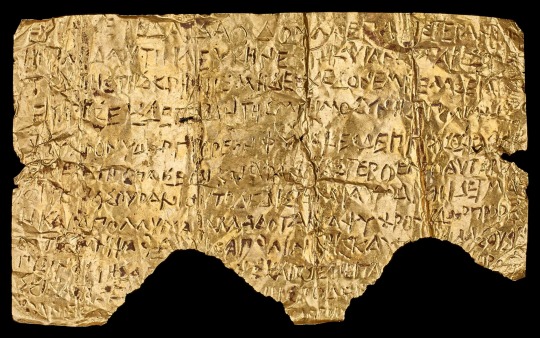
Made from a sheet of gold foil, this tablet measures just 4.5cm (a little over 1.5 inches) in length, and although it was found inside a pendant case in Petelia, Italy, it's believed to have originated in ancient Greece. It was meant to aid the dead in their journey through the Underworld -- providing them with specific instructions, conferring special privileges, and granting them access to the most coveted realms within the afterlife.
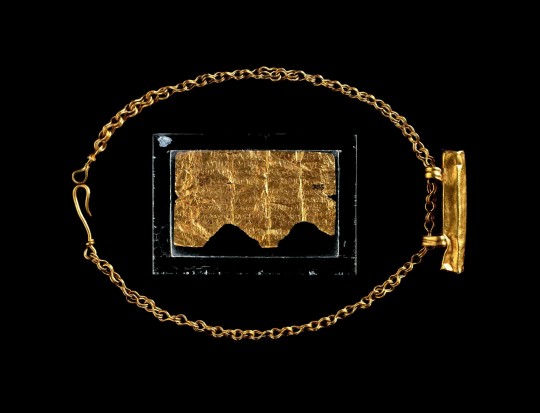
The Petelia tablet, displayed with the pendant case in which it was discovered
The tablet itself dates back to about 300-200 BCE, while the pendant case/chain that accompanies it was likely made about 400 years later, during the Roman era. It's believed that the tablet was originally buried with the dead, and that an unknown individual later removed it from the burial site and stuffed it into the pendant case. Unfortunately, in order to make it fit, they simply rolled it up and then snipped off the tip of the tablet. The final lines of the inscription were destroyed in the process.
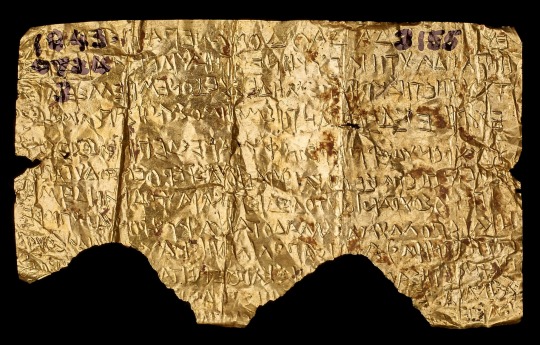
The inverse side of the Petelia tablet
These textual amulets/lamellae are often referred to as totenpässe ("passports for the dead"). They were used as roadmaps to help guide the dead through the Underworld, but they also served as indicators of the elite/divine status of certain individuals, ultimately providing them with the means to obtain an elevated position in the afterlife.
The Petelia tablet is incised with an inscription in ancient Greek, and the translated inscription reads:
You will find a spring on your left in Hades’ halls, and by it the cypress with its luminous sheen.
Do not go near this spring or drink its water. You will find another, cold water flowing from Memory’s lake; its guardians stand before it.
Say: "I am a child of Earth and starry Heaven, but descended from Heaven; you yourselves know this. I am parched with thirst and dying: quickly, give me the cool water flowing from Memory’s lake."
And they will give you water from the sacred spring, and then you will join the heroes at their rites.
This is [the ... of memory]: [on the point of death] ... write this ... the darkness folding [you] within it.
The final section was damaged when the tablet was shoved into the pendant case; sadly, that part of the inscription does not appear on any of the other totenpässe that are known to exist, so the meaning of those lines remains a mystery (no pun intended).
Lamellae that are inscribed with this motif are very rare. They're known as "Orphic lamellae" or simply "Orphic tablets." As the name suggests, these inscriptions are traditionally attributed to an Orphic-Bacchic mystery cult.
The inscriptions vary, but they generally contain similar references to a cypress tree, one spring that must be avoided, another spring known as the "Lake of Memory," the sensation of thirst, and a conversation with a guardian (or another entity within the Underworld, such as the goddess Persephone) in which the dead must present themselves as initiates or divine individuals in order to be granted permission to drink from the Lake of Memory. They are thereby able to obtain privileges that are reserved only for the elite.
Though the specifics of this reward are often vague, it may have been viewed as a way to gain access to the Elysian Fields (the ancient Greek version of paradise) or as a way to participate in sacred rites; some totenpässe suggest that it may have allowed the soul to break free from the eternal cycle of reincarnation. Regardless, the overall objective was likely the same: to obtain a special status and acquire privileges that were inaccessible to most of the souls in the Underworld.
Sources & More Info:
Altlas Obscura: The Ancient Greeks Created Golden Passports to Paradise
The Museum of Cycladic Art: The Bacchic-Orphic Underworld
Bryn Mawr College: Festivals in the Afterlife: a new reading of the Petelia tablet
The Getty Museum: Underworld (imagining the afterlife)
The British Museum: Petelia tablet (with pendant case; chain)
#archaeology#history#anthropology#ancient greece#ancient history#greek mythology#Petelia tablet#Greek mysteries#orphic mysteries#orphism#greek underworld#hades#persephone#anthropology of death#religon#afterlife#tw death#classical antiquity#classical archaeology#ticket to paradise#whoever damaged this#probably#got#a#ticket#to tartarus#instead
2K notes
·
View notes
Text
Greek Goddess Legacy Challenge: Generation #1: Gaia, Complete sheets
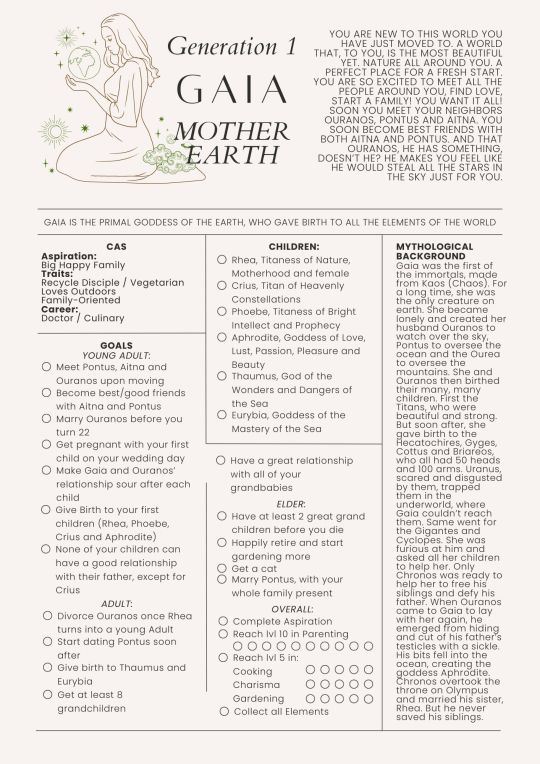
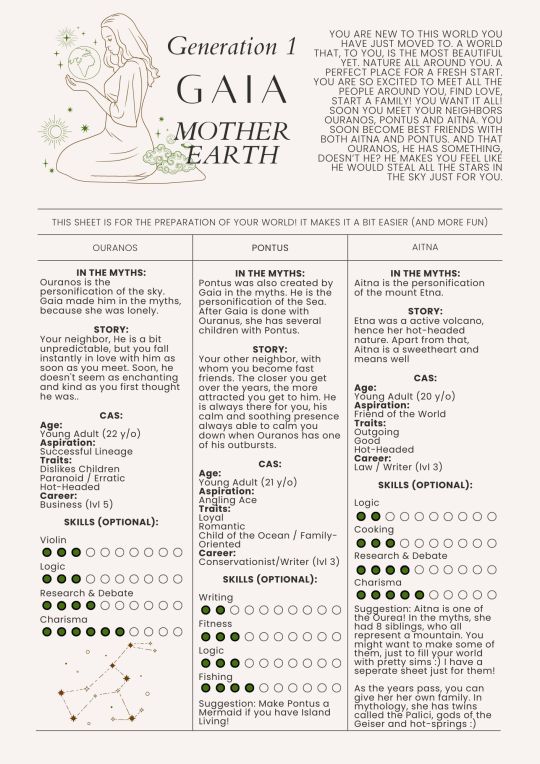
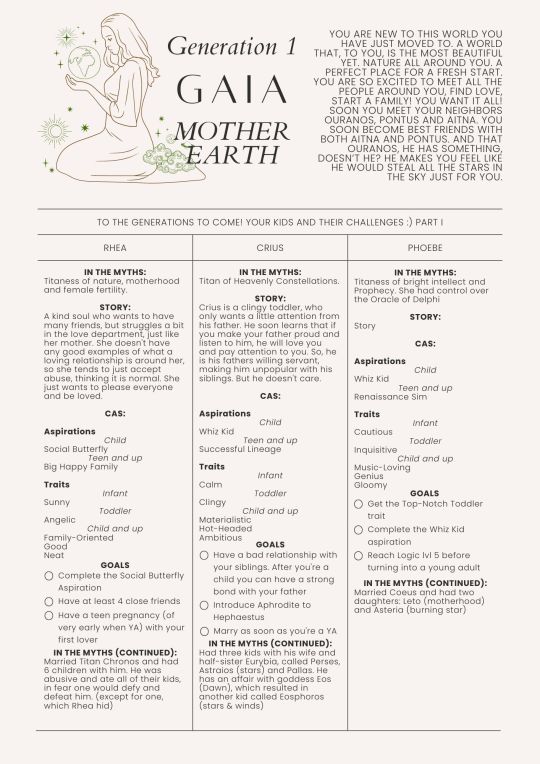
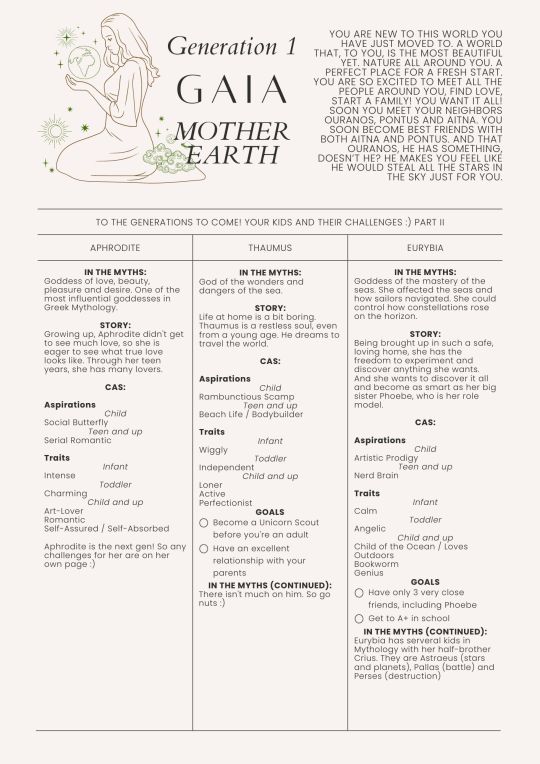
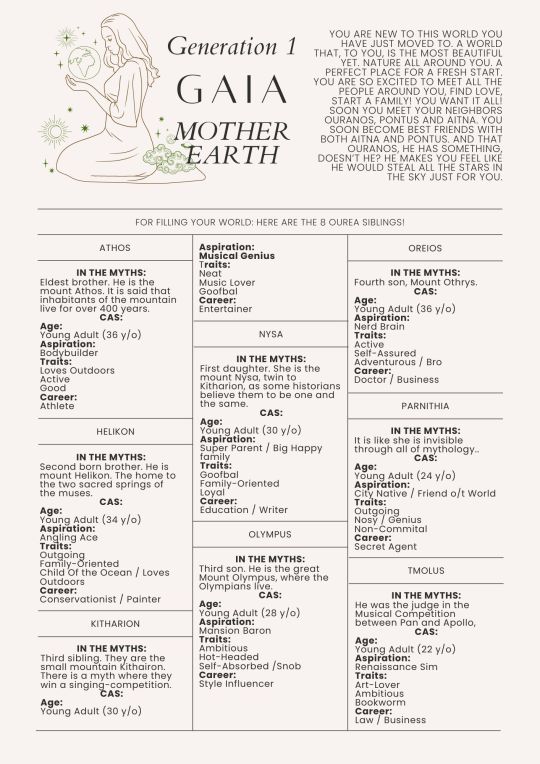
I present to you, the woman who started it all: Gaia! Or, as we know her now, Mother Earth. Enjoy this challenge :)
You are new to this world you have just moved to. A world that, to you, is the most beautiful yet. Nature all around you. A perfect place for a fresh start. You are so excited to meet all the people around you, find love, start a family! You want it all! Soon you meet your neighbors Ouranos, Pontus and Aitna. You soon become best friends with both Aitna and Pontus. And that Ouranos, He has something, doesn’t he? He makes you feel like he would steal all the stars in the sky just for you.
Little bit explanation with the sheets: - First sheet is for describing your current generation, with the challenges you need to do each life-stage. Also, because I love the myths, a bit of mythological background. May it inspire you :) - Second sheet is the preparation sheet for this generation, with important characters for your story. It is technically optional, but I love seeing sims with a backstory in my world, so I would highly recommend it. - Third sheet is for your gens children. They all have their own little challenges if your interested in those. I try to make all of them a bit different from each other, so it doesn't get boring. Your heir is also on this sheet, but I've put their challenges on their own sheets. Stay tuned for those ;) - Fourth sheet is completely optional. If you want sims with names from the myths and love making sims to see them in your world, this is for you! All with a little mythological background ofc, you know me.
Finished Gaia's Challenge? The next generation is Aphrodite! If you want to try her childhood challenges as well, look up her page once she is born :
The Greek Goddesses Challenge by LJJ-Sims is a challenge based on the ancient mythical creatures and stories from Greece. I fell in love with Greek mythology in high school and have not let that love go since. In this challenge you will follow 10 deities in their journey through life. Every goddess has a different take on and goal in life. Special about this challenge? All your kids have little challenges of their own, not only your heir. These challenges are optional, so if you feel like these are too much or just too restricting for you: by all means let them go. I also have sheets for characters that you can make before you start each generation. This gives your challenge a lot more personality and makes it frankly easier and more fun!
A little disclaimer: because I made these gods and goddesses into a legacy challenge, the relationships in the myths don’t exactly match the relationship in this challenge. There is a lot of keep it in the family in mythology, to put it lightly. And apart from the fact that you can’t do that in the Sims, I don’t really like that part. So I didn’t include it, thus the inconsistency. An example: Ares is now Hera’s stepfather instead of her son, which she conceived with her brother and husband Zeus. This inconsistency can also be found in the stories. It’s just based on and not copied exactly, as Sims live lives that are a lot shorter than those of immortal gods. And it takes a way from the creativity if we just copy the myths. Even if we wanted to do that, it’s quite hard, as every myths has its fair share of variations and some are just completely different stories.
I use the MCCC-mod to alter the length of life states. You can find the days-years ratio here: the boring stuff.
#sim#sims#maxis match#sims 4#ljjsims#ljj#ljjchallenge#challenge#sims 4 legacy#ts4 legacy#sims 4 story#sims 4 gameplay#ts4 gameplay#thegreekgoddesslegacychallenge#greek goddesses#greek goddess#greek gods#greek mythology#greek posts#mythology#ancient greece#ancient greek#myth#greek deities#sims 4 challenge#sims challenge#ts4#the sims#the sims 4#gaia
383 notes
·
View notes
Text
Bharani : the birth of Venus.
Part 1
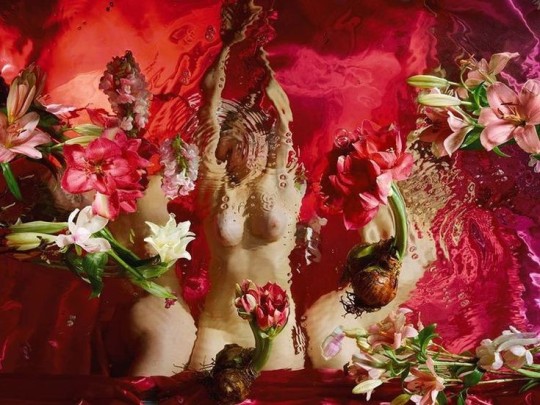
Let's talk about ancient godesses of love and Bharani nakshatra.
I will base my research on the legend of the dead and resurrected god present in many religious myths coming from the middle east (ps : i'm sorry in advance for the grammar, syntax or spelling mistakes that you may find in this post, english is not my first language)
Bharani, situated in the heart of the rashi of aries is governed by Shukr: Venus but also by Yami and Yama in vedic mythology who are twins and gods respectfully of life and death.

Yama, the main deity of Bharani is said to be one of "8 celestial gatekeepers, who guards eight directional doorways or exits through which souls travel from an earthly plane to other planes of existence" making him the lord of Dharma since at one's death, he decides basing on his actions in what plane should one reincarnate.
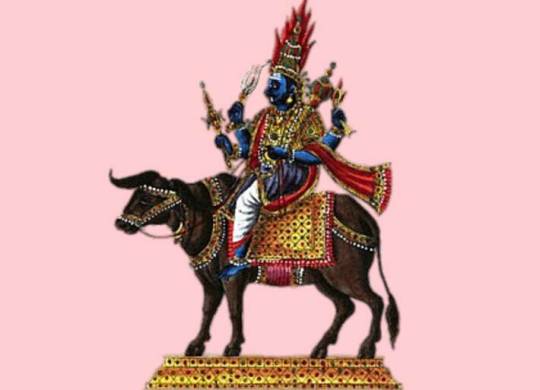
Since Yama is responsible for directing the flow of life on Earth the association between bharani and the yoni becomes evident: the female reproducting system serves as a portal for souls to take on a physical form. So bharani as Claire Nakti perfectly described it relates to the feminine ability to receive, hold, nurture and ultimately transform through the womb.
Because Bharani aligns itself with all the feminine qualities by excellence it makes sense as to why Venus is it's ruler.
Venus is the roman name for the goddess Aphrodite: in greek mythology. She is said to be the goddess of love and beauty at large but also the goddess of war and sexuality. First because the ancient greeks saw the duality that links love to war and how they seem to come together through sex.
Also, Aphrodite is said to be born from the sperm of Ouranos when his testicules got cut by his son Saturn as he was always feconding Gaia, the Earth and causing her distress: he was acting cruel regarding their children. The sperm of Ouranus got mixed up with the foam of the Ocean creating Aphrodite which means "risen from the foam". So it was interesting to see that as Shukr also means sperm in sanskrit and it shows the origin of Venus as a fertility goddess too.
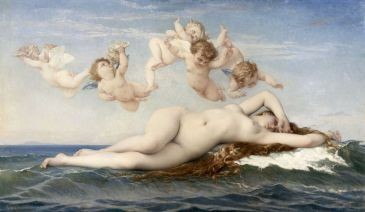
This conception of Aphrodite directly links her to ancient goddesses of love such as Ishtar or Inana in Mesopotamian/summerian mythology or Isis in egyptian mythology. Most of the time, these goddesses are the female counterpart of a god that was once mortal, got cursed, died and then came back to life for them to form an immortal couple.
In the case of Ishtar, her consort is Dumuzi or Tammuz and Osiris is the consort of Isis.
In Mesopotamian mythology :
Ishtar or Inana in sumerian is the goddess of love and sexuality, beauty, fertility as well as war because of her status as a " bloody goddess" mostly refering to her character in plenty of myths.
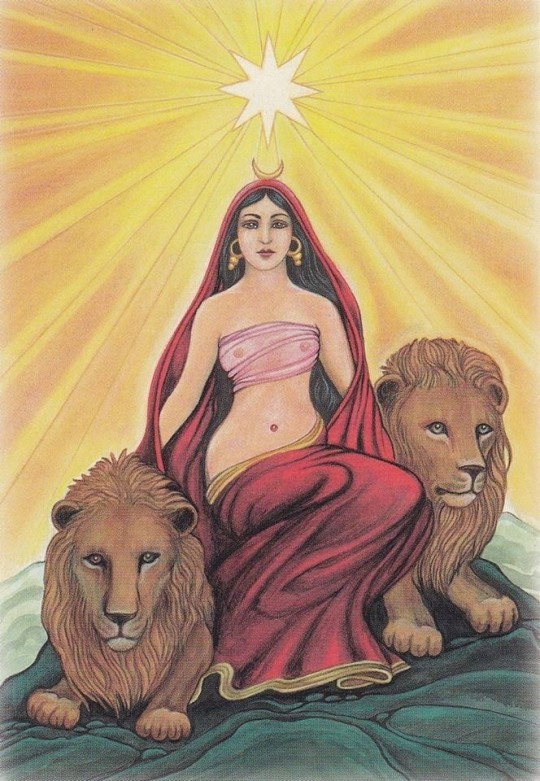
For example: in one story, she became infatuated with the king Gilgamesh, but the latter knowing her fierce reputation, refused her advances. As a result she got furious and unleashed the celestial Bull on Earth which resulted in 7 years of plagues. This celestial bull was later defeated by Gilgamesh and Endiku, and its corpse was throwed in front of Inana. Blinded by rage, she decided that as a punition Enkidu must die and sad at the death of his bestfriend Gilgamesh began his journey to find a cure to Death.
Bharani is a fierce or Ugra nakshatra meaning that its nature is agressive, bold and assertive in pursuing their goals. They are ruthless in the process of accompling what they desire the most and are inclined to extreme mood swings that can result in them to be "blinded" by their extreme emotions perfectly expressing the passionate character of Venus and her other equivalents in differents pantheons of antiquity.
Inana/ Ishtar's story with Dumuzi/Tammur begins as she was convinced to chose him by her brother Utu. Then she got married with the shepphard Dumuzi instead of whom she prefered the farmer: Enkinmdou. During the courtship, Inana prefered the fine textile of the farmer and his beer rather than the thick wool and milk of Dumuzi. The preference for the shepphard illustrates that at the time the Mesopotamian civilisation was known for their proliferent agriculture with the egyptians in the region, so this myth encapsulate the opposition between nomads and sendatary people at this specifific time period.
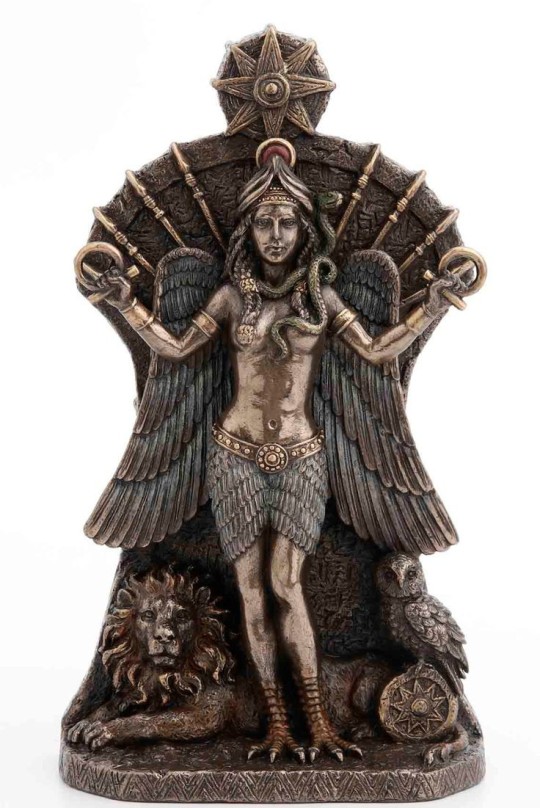
By the way, another symbol of Bharani is the cave and traditionnaly, the cave was used as a storage room for food. Also Bharani's purpose is Artha so these individuals are motivated to accumalate resources and provide safety and security, so Bharani can be linked to the exploitation of natural ressources like the soil illustrating the preference of Ishtar for the farmer. This is reinforced also by its Earth element.
So coming back to the myth, in a mesopotamian text called Inana's Descent to the Underworld, the goddess goes to Kur (hell) with the intent of conquering it, and her sister Ereshkigal who rules the Underworld, kills her. She learns that she can escape if she finds a sacrifice to replace her, in her search, she encounters servants who were mourning her death however she finds Dumuzi relaxing on a throne being entertained by enslaved girls. Enraged by his disloyalty she selects him as a sacrifice and he is dragged to the Underworld by demons.
He is eventually resurrected by Inana and they become an "immortal couple" as he may only come back to life for half of the year, being replaced by his son (?) who is also his reincarnation for the other half of the same years, so describing the cycle of regeneration of life.
Other mythologycal stories of goddesses in the near east describe a similar patterns:
The goddess Asherah is described as being the mother and the lover of her son Adonis.
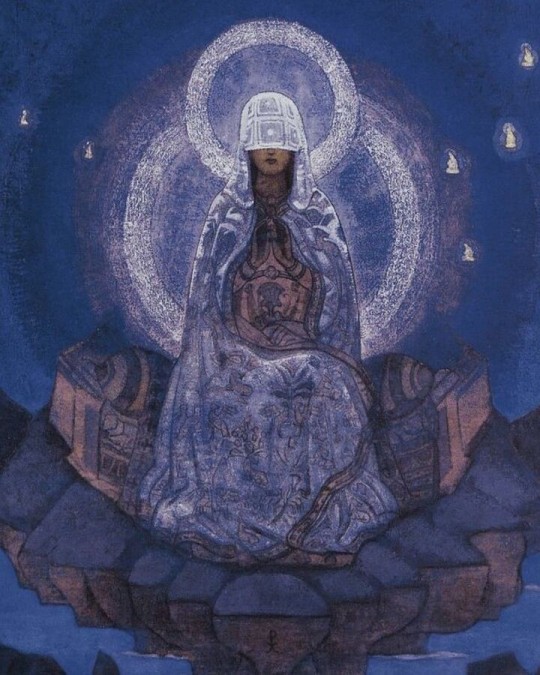
The goddess Cybele in the phrygian pantheon takes the form of an old woman as she described as the mother of everything and of all. And at the same time she is the consort of Attis who his her own son (wtf ?)
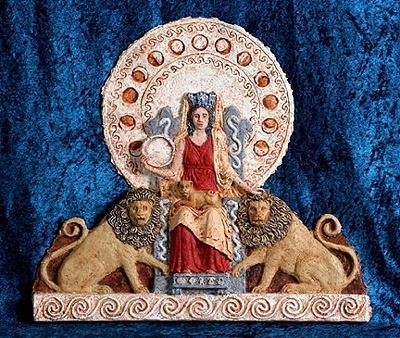
Also, Yama and Yami are implicated in a incestuous entanglement where his sister Yama wanted to lay with him however he refused establishing himself as a god with an infaillible moral campus.
All of these representations illustrate the relation between the masculine and the feminine, life and regenration which are all topics related to Bharani nakshatra. Women by their capacity to give life are seen as the source of life and therefore are eternal as they are able to regenarate themselves through daughters which are identical to them whereas man who is unable to reproduce by himself, is therefore mortal feels the need to associate with her to resurrect through a son who is identical to him. Bharani exiting as the embodiment of the link between "the father and the offspring" which is the feminine vessel.

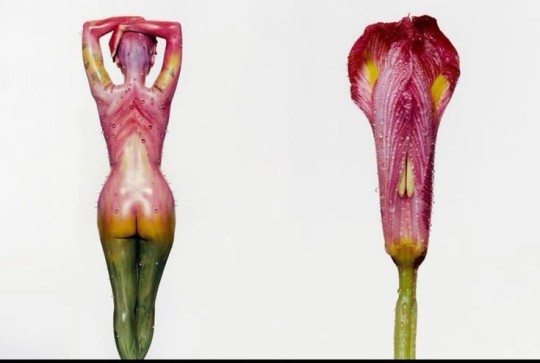
So this is certainly part 1, I think that these ancient myths are where Claire Nakti found her inspiration for her series on Bharani.
#vedic astrology#cinema#coquette#astrology#vintage movies#aesthetic#coquette dollete#fashion#vintage#movies#greek mythology#roman mythology#ancient egypt#bharani#chitra nakshatra#purva bhadrapada#purva phalguni#cowboy carter#venus#adonis
240 notes
·
View notes
Text
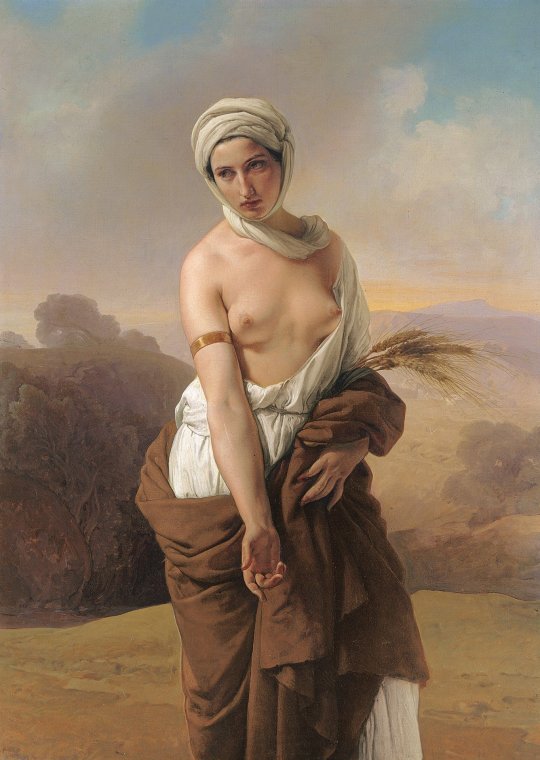
Virgo – The Ancient Greek Myth Behind the Zodiac Sign
Of all the twelve zodiac signs Virgo is maybe the most misunderstood, owing to the confusion of the translation of the word virgo, which, in Latin, means self-contained or self-sufficient and originally applied to unmarried women, including mothers.
The word Virgo should not be interpreted as a woman who is a virgin but more as a nurturing woman; mother to all of the Earth.
The following excerpt, taken from the gnostic text, ‘The Thunder, Perfect mind’, where the Greek goddess of wisdom, Sophia, states who she is, goes along way in helping to clear up the misinterpretation of the word virgo, or virgin and shows us that being a virgin has nothing to do with chastity :
‘For I am the first and the last. I am the honoured one and the scored one. I am the whore and the holy one. I am the wife and the virgin. I am the mother and the daughter. I am the members of my mother. I am the barren one and many are her sons. I am she whose wedding is great, and I have not taken a husband. ‘
The goddesses associated with Virgo are thought to be fertility goddesses or goddesses of the harvest which ties in with the Greek myth of Demeter; Greek goddess of the harvest, as the constellation Virgo is thought to be a woman holding a spike of corn, so resonating with the Harvest Mother myth. Portrait of a woman: Ruth (Ruth, by Francesco Hayez) Undated.
63 notes
·
View notes
Note
Hello, thank you for your hard work, you page is really useful!
I’m looking for some Hades and Persephone AU fics since I’m obsessed with the idea of our favorite angel and demon as Greek gods, but I suck at scrolling through Ao3 tags. Is there any chance you can find them?
Hi. There is an Inspired by Hades and Persephone (Ancient Greek Religion & Lore) tag on ao3. Combine that with a Good Omens tag of your choice and you will only have a couple of pages to look through. Here's a selection...
beneath the weigth of the goodness by ashms (E)
A retelling of the myth of Hades and Persephone. The Underworld god Crowley falls in love with the god of agriculture Aziraphale and abduct him.
Pomegranate Seeds In Your Heart by WaitingToBeBroken (T)
Persephone/Hades AU In which Crowley is the god of the Underworld, calls Aziraphale 'petal' and is his normal protective and oblivious self. Enter Aziraphale, the god of spring, whose only problem with visiting his friend is that he is not allowed to eat anything. Throw in the fact that he can make flowers grow from underneath his feet but is, also, very oblivious to their meaning and you get a fluffy retelling of our most beloved myth.
Of Roses and Pomegranates by pilatesandpinot (E)
Flower nymph Aziraphale is about to take her vows of maidenhood in honor of the goddess Artemis, but she can’t bring herself to turn her back from the dryad who’s captured her heart, Crowley. To be with the one she loves and redefine her destiny, Aziraphale runs into the dark forest of Arcadia, where Crowley serves as a guardian, and makes the ultimate vow. A retelling of the Hades and Persephone myth.
The Myth of Aziraphale by Shay_Moonsilk (E)
“I didn’t really Fall,” Crowley reflected, twisting the apple about in his hands. “Just, you know. Sauntered vaguely downwards.” “Downwards, into ruling the Underworld?” Aziraphale asked, unable to keep the dubiousness out of his voice. He kept his gaze on the demon’s face, lest he be tempted to eat the apple and seal his fate to Crowley. It did look rather tempting. The King shrugged and said, “Promotions come easy to me,” and took a large bite, though it was Aziraphale himself that felt devoured. --- Armageddon never happened. Crowley is the King of Hell. Aziraphale doesn't want to get married to an angel he doesn't love. Perhaps time in the underworld will help them find the answers they need.
When Earth Freezes Over by WorseOmens (NR)
When Earth freezes over, it’s springtime for the Underworld — but it wasn’t always that way. Aziraphale, God of Spring, was once isolated from the other gods by his overbearing mother. Crowley, God of the Underworld, wanted him to take the freedom he deserved — and all it took, in the end, was a little piece of fruit, and a lot of temptation. (Good Omens Hades & Persephone AU)
The God Below by ChubbyHornedEquine (M)
In order to have good crops, a spring & summer, every year someone is sacrificed to The God Below. (Hades/Persephone/A dash of beauty and the beast inspired AU.)
- Mod D
87 notes
·
View notes
Text
On Hera and Zeus’s marriage: a rant
I’ve seen a lot people get mad at Zeus because his application of marriage in mythology is a bit more flexible than what we’re used to, while misunderstanding the theological and cultural realities that surround it
The Native Hera and the Foreign Zeus
Long ago, before what is now known as the Greek pantheon was a thing, the Greeks worshipped the goddess now known as Hera, and she was their main goddess. Some time later, another group of people, recognisable as derived from Proto-Indo-European descent through their worship of a sky father (Zeus), either conquered or merged with the existing culture of the time.
These two groups, to avoid too violent of a clash while merging, made their patron deities spouses to make the transition more smooth for everyone, effectively breaking the Proto-Indo-European pattern of sky god-earth goddess duos, while still being present to a lesser extent in the form Demeter’s brief marriage with Zeus.
Divine marriage
Now, we all know Zeus in his myths was quite a womaniser, both because of his function as an All-Father, and as his function as the representation of Ancient Greek patriarchal society where men could have as many extramarital affairs and women could not. Note the fact that this was completely allowed and accepted in Ancient Greece, and that other male deities with known spouses still slept around without their wives getting angry (eg Poseidon and Dionysus).
Why is that so? One could simply dismiss this by saying that Hera is just “being jealous”, but the answer is deeper than the surface level.
The marriage of Zeus and Hera is meant to be egalitarian, meaning that they occupy the same position and receive the same amount of honour in Olympian society, and Hera, as defender and mistress of Olympus, has to constantly check whether or not there is a breach of that egalitarian semi-open marriage or an attack on her honours as both queen of the gods and equal partner of Zeus.
Now, Hera is well-known for her fury against Zeus’s mistresses, and while this may seem funny/tragic to people, it’s not rlly ALL of them that had that treatment. The only ones of Zeus’s mistresses (that I know of) that received any kind of attack from Hera were Leto, Alcmene and Semele. (This ill reputation of Hera as a jealous wife might mostly be due to Heracles, but we’ll get back to him later)
Leto and Semele
Leto was one of Zeus’s previous wives before Hera came in power, and she conceived her children, Apollo and Artemis after Zeus and Hera got married (UPG). Semele was a mortal princess from a very important family line, who Zeus took a liking to and came down to often, even swearing to her on the river Styx to give her anything she wanted. This could tickle Hera the wrong way for 2 reasons: Leto, a previous queen, and Semele, a mortal, may have started to feel proud of Zeus’s special attention, and that their children (Apollo & Artemis, and Dionysus respectively) were destined to eventually enter her home due to them being very important. The first point could just be a reminder of Hera’s supremacy as Queen of Heaven, and sends a clear message: “Just because the King gives you special favours doesn’t mean you are above, or better than me”.
The trials that face Heracles, Apollon and Dionysus (ie madness followed by redemption, Python, and a period of madness respectively) could therefore be tests to prove their worth and proof that Zeus did not waste his time and energy making children unfit to integrate the Olympian family without some pushback. Zeus famously spent 3 days conceiving Heracles, whose famous fate at the hands of Hera could be seen as trials in her honour, as evidenced by his name which means “the glory of Hera”. When he ascends to Olympus, he even goes as far as marrying Hera’s daughter, Hebe.
Conclusion
Hera is not a jealous wife, and her marriage with Zeus is certainly not dysfunctional. They love each other deeply (see: the foundation myth of the Daidala festival) and their relationship is certainly not something to be questioned or made fun of. Honouring Hera properly means honouring Zeus, and vice-versa.
On that note, I wish you all a happy Theogamia.
#hera deity#Hera#Zeus deity#Zeus#helpol#paganism#Greek mythology#this is for the people who call Zeus an asshole#and those who want a story where they’re divorced#I rlly hate when that happens
98 notes
·
View notes
Text
it's always a joke i see passed around, but it's also based in a misconception of it, but roman and greek mythology are vastly different.
roman gods and goddesses were named after objects and did not possess a gender, whereas greek gods were decided by human characteristics and traits.
2. greek gods had heavy emphasis placed on their physical appearance, both beauty, and unsightliness. the description of their physical appearance would come from the myth itself. greek mythology would describe the gods and goddesses as having strong characteristics. these characteristics would have a direct impact on the physical appearance they were given, while roman gods were not described in such a way. roman gods had less emphasis put on their characteristics; therefore, their physical appearances were less strong if there was a physical depiction of them at all.
3. many myths are told differently like the trojan war and odysseus' return.
4. in greek mythology, mortal greek heroes were just as important as greek gods and goddesses. greek heroes often had roles that taught life lessons that were just as important as the myths that were told about greek gods and goddesses. greek mythology emphasized the importance of good deeds mortals performed on earth. roman mythology was different in this way. roman mythology did not put emphasis on the works of mortal heroes in regards to their life on earth because roman mythology believed in an afterlife (greeks did too but not in a strong way as romans did).
5. the greek culture viewed deities as an unattainable being. this means that mortals would never be able to reach deity status and have a place among the gods they worshipped. instead, they would have to do good works on earth to have the honor of the gods during their time on earth. roman culture was different. romans believed that mortals should try to aspire to be like the gods they worshipped. part of the reason is that they used the roman gods and goddesses as an inspiration to live life the right way. the other reason is that they believed in an afterlife that they would attain when their life on earth was over.
6. the gods had much different attributes differing from greek and roman; ares was the unpredictable spirit of war, and he wasn't the most popular god, but in rome, mars was hugely popular and was worshipped much more than the greek ares. demeter was the goddess of the harvest and grains, while ceres was those things as well plus art and culture.
7. in greek mythology, the afterlife does not hold much importance. in fact, gods and mortals are regularly snatched from the afterlife and brought in to the present showing no concern for the afterlife. the greek perspective is much more concerned with the physical life on earth as opposed to the afterlife. mortals are remembered and rewarded for their good deeds on earth. in contradiction, the romans did good deeds to secure their place in afterlife. they could even earn a place among the gods and through their life on earth strove towards this goal.
i know it's funny to be like "romans copied greeks," i don't view it as copying and pasting, i view it as the being inspired by greek gods and greek mythology and applying it to their own religions, and that's not a weird, uncommon thing. greeks also borrowed from other cultures to form their own gods. ancient greeks borrowed from minoans, mycenaeans, egyptians and phoenicians. THAT IS NOT A BAD THING! greek language also helped expand the italian language as well, they expanded their own knowledge with knowledge they learned from greeks, and other cultures they came across.
another complaint i see is "they conquered greece, so greeks didn't have a choice." i don't know how to tell you this in the most polite way, but conquering land in this time was gigantic and very common and normal! how do you think the mongolians became so powerful, they didn't do it through peaceful encounters. everybody did it, it's how culture spread so rapidly through the ancient world, not to mention through trade.
i know it's funny to say the italians copied greeks, but get over yourself, it's not funny nor is it correct.
#ive seen many uneducated comments and i had to set some of the picture straight#greek mythology#roman mythology
293 notes
·
View notes
Text
Zagreus Sabazius
Important reminder. Everything I write about here is only indirectly connected by distant assumptions and rare crossings and absolutely should not be considered the immutable truth. As someone whose patron is Zagreus, I write about my findings and assumptions, but I am also totally possibly to be mistaken and see what I want to see myself. Take everything with a grain of salt.
We have already once looked at the Greek sources with the story of Zagreus. But beyond the rare surviving Greek sources, we will always have something else. Why is Zagreus sometimes mentioned with the epithet “Sabazius”? What does this epithet mean? What are Zagreus' powers? And why, after all, is he and Gaia called “highest of the all gods” in the Alcmeonis?
Welcome to my deep dive on one of the most mysterious theoi — Zagreus Sabazius.

So, later Greek writers, like Strabo in the first century CE, linked Sabazios with Zagreus. But who is Sabazios and what does it mean?
Sabazius comes from a common root with Sanskrit sabhâdj, honored, and with Greek σέβειν, to honor. It's also may be connected with the Indo-European *swo-, meaning "[his] own," and with the idea of freedom.
Sabazios is a deity originating in Asia Minor. He is the chief sky god of the Phrygians and Thracians. Sabazios gained prominence across the Roman Empire, particularly favored in the Central Balkans due to Thracian influence. On some monuments Sabazius is called “master of the cosmos”.

Decree of the organisation of worshippers of Sabazius, 102 BC
It seems likely that the migrating Phrygians brought Sabazios with them when they settled in Anatolia in the early first millennium BCE, and that the god's origins are to be looked for in Macedonia and Thrace. The ancient sanctuary of Perperikon in modern-day Bulgaria, uncovered in 2000, is believed to be that of Sabazios.


Two altars in the sanctuary were used for blood sacrifice.

And as Euripides has already graciously told us, Zagreus was honored as a god of blood, among other things. Sabazius, as a deity, was often associated with sky, thunder, nature, boons, mystery, and blood. One of its most frequent symbols was serpent.
Sabazius' references sometimes included Cybele. She is an Anatolian mother goddess. She is Phrygia's only known goddess, and was probably its national deity. Greek colonists in Asia Minor adopted and adapted her Phrygian cult and spread it to mainland Greece and to the more distant western Greek colonies around the 6th century BC.
In Greece, Cybele met with a mixed reception. She became partially assimilated to aspects of the Earth-goddess Gaia, of her possibly Minoan equivalent Rhea, and of the harvest–mother goddess Demeter.
And now everything suddenly made sense. Why are Gaia and Zagreus named the highest of all the gods in Alcmeonis? Because they always have been.

In her transition to Greece, Cybele, Phrygia's only known goddess, was named Gaia (which honestly makes much more sense to me than associating her with Rhea or Demeter). And Zagreus? And Zagreus remained Zagreus.
Gaia Cybele and Zagreus Sabazius, Mother Earth and Sky King, the highest gods of the Phrygians and Thracians, who later also made their way to Greece.
But unfortunately, no individual direct myths about King Sabazius have survived either.
But there was also one thing that persisted and always baffled me.
In my personal experience with Zagreus, his signature weapon has always been moonblades to me. And I always wondered why. What does Zagreus have to do with the moon? Why is it always an integral part of his power and history in my experience?
Well, now I know the answer.
At one point Sabazius merged with the Asia Minor and Syrian moon deity, Mēn. Mēn was a lunar god worshipped in the western interior parts of Anatolia. He is attested in various localized variants, such as Mēn Askaenos in Antioch in Pisidia, or Mēn Pharnakou at Ameria in Pontus.

Bust of Mēn in Museum of Anatolian Civilizations
In the Kingdom of Pontus, there was a temple estate dedicated to Mēn Pharnakou and Selene at Ameria, near Cabira (Strabo 12.3.31). The temple was probably established by Pharnakes I in the 2nd century BC, apparently in an attempt to counterbalance the influence of the Moon goddess Ma of Comana. The cult of Mēn Pharnakou in Pontus has been traced to the appearance of the star and crescent motif on Pontic coins at the time.
A similar temple estate dedicated to Mēn Askaenos existed in Pisidia, first centered around Anabura and then shifted to the nearby city of Pisidian Antioch after its founding by the Seleucids around 280 BC. The temple estate/sacred sanctuary (ἱερόs) was a theocratic monarchy ruled by the "Priest of Priests," a hereditary title. According to Strabo, this "temple state" that the cult of Mên Askaenos controlled near Pisidian Antioch, persisted until the city was refounded by the Romans in 25 BC, becoming Colonia Caesarea Augusta.
The Augustan History has the Roman emperor Caracalla (r. 198–217) venerate Lunus at Carrhae; this, i.e. a masculine variant of Luna, "Moon", has been taken as a Latinized name for Mēn.
Even though no specific myths have survived about any aspect of Zagreus, it gives us a wealth of information about what Zagreus was and is and the diverse number of domains he holds.
Yes, Zagreus. Zagreus, god of mysteries, blood, flesh, sky, thunder, nature and moon. Zagreus Sabazius, Zagreus Mēn, Zagreus the Winged Serpent Hunter, Zagreus the Scarlet Thunderer, Zagreus the Serpent King. Zagreus Prince of Chthonia, Zagreus King of Sky, Zagreus Highest of All the Gods, Zagreus Master of the Cosmos.
Ζαγρεύς Σαβάζιος
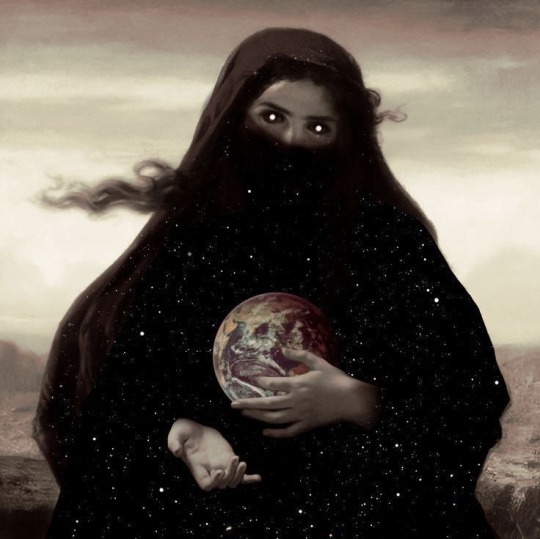
#zagreus#zagreus deity#zagreus sabazius#Zagreus Mēn#Ζαγρεύς#Ζαγρεύς Σαβάζιος#Ζαγτεύς Μήν#greek mythology#greek gods#hellenic polytheism#hellenism#greek myth#greek pantheon#hellenic gods#theoi#sabazios#Mēn#hellenic deities#helpol#greek history#ancient greek#ancient greece#ancient greek mythology#ancient greek gods#ancient greek religion#ancient history#mythology#as you can see I'm still in dire need of psychiatric help
34 notes
·
View notes
Text
The King of Annwn
Brythonic Paganism Essays: Part I
The Usual Disclaimer: The tales of The Mabinogion and other surviving Welsh texts were once shared orally, passed down across generations, and over vast distances. By the time these stories were finally committed to writing, the Welsh had long embraced Christianity. As a result, what remains in these medieval manuscripts offers only a faint echo of the ancient beliefs held by the Brythonic or Romano-British peoples. Yet, by examining these stories in relation to one another, and drawing parallels with other Celtic or even Indo-European traditions, we may catch glimpses of the older beliefs that inspired them. What follows is simply theory, built upon these comparisons.
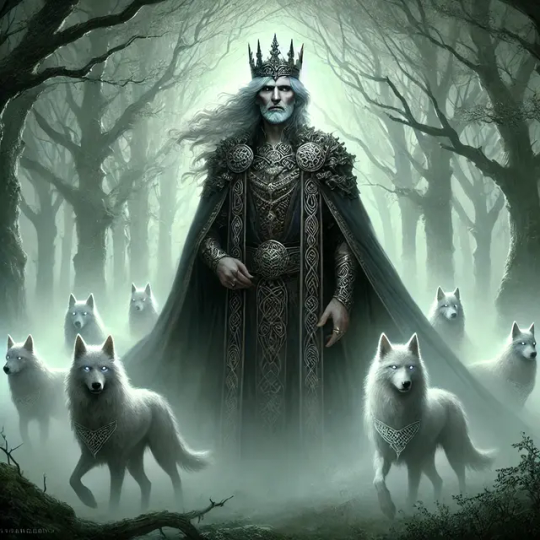
There are many contenders for the title of King or Lord of Annwn, the Otherworld in Welsh mythology. So many, in fact, that most Brythonic polytheists I’ve spoken to tend to agree that Annwn, like the mortal world, has multiple rulers. However, I believe these deities share too many similarities to be entirely distinct. Rather, I see them as different aspects or variations of a much older, singular god. Before delving into the gods themselves, let’s examine the key motifs:
The God-King is often depicted as a hunter, accompanied by the Cŵn Annwn—the hounds of Annwn—described as pure white with red ears.
He is locked in an eternal, seasonal conflict, where he can be seen as representing winter, battling against an opponent who embodies summer.
This struggle often revolves around a goddess who symbolizes spring, the earth, or fertility. This mythic framework is incredibly ancient, with perhaps the most well-known version being the story of Persephone in Greek mythology.
The conflict often involves a journey to the Underworld and escalates to such intensity that a mortal king must intervene.
The god is also often depicted as a psychopomp—an entity that guides the souls of the dead to their final destination, much like the Grim Reaper. However, it’s important to note that Annwn wasn’t necessarily viewed as an “afterlife” by its original believers. Instead, it was more of a mystical realm, later misunderstood and conflated with Hell or Hades through the lens of Christian propaganda.
Arawn
Pwyll, King of Dyfed, embarks on a hunt and encounters a pack of white, red-eared dogs bringing down a deer. He claims the kill for himself, only to be confronted by Arawn, the true owner of the hounds, who is also hunting. To make amends for his transgression, Pwyll agrees to a request from Arawn: they will swap appearances and live as each other for one year. Arawn explains that he goes to war every year with Hafgan—a name meaning something like "summer song" or "summer white"—for rulership of Annwn. Despite defeating Hafgan in combat each time, Arawn always loses in the end. As Hafgan lays dying, he taunts Arawn to strike again, and Arawn, unable to resist, delivers the fatal blow—only for Hafgan to be magically revived.
Pwyll agrees to the plan and spends a year living in Annwn disguised as Arawn. Though he shares a bed with Arawn’s Wife every night, Pwyll honors the situation and never takes advantage of it. When the time comes to face Hafgan in battle, Pwyll defeats him but refuses to strike the final blow. With Hafgan dead, his followers recognize Arawn as the true King of Annwn.
Here, we see the recurring motifs of the hunt, the yearly conflict with summer, and the intervention of a mortal king. In this version of the myth, it is the King who travels to the Otherworld, not the goddess who is absent. While the myth lacks a love triangle with a goddess, Arawn’s unnamed Wife does play a role, with her honor preserved, this was included in the story for a reason. The psychopomp element isn’t explicitly referenced in this story, but other familiar themes remain.
Gwyn ap Nudd
Culhwch desires to marry Olwen, the daughter of the giant Ysbaddaden. However, Ysbaddaden knows that he is doomed to die once his daughter marries, so he sets Culhwch forty impossible tasks. One of these is to slay the monstrous boar Twrch Trwyth, a cursed Irish king who now roams Britain as a destructive beast. Culhwch seeks help from his famous cousin, King Arthur, who agrees but warns that to hunt this particular monster, they will need the aid of Gwyn ap Nudd.
Gwyn ap Nudd - whose name means "White Son of Mist" - is somewhat preoccupied at the time, having just abducted the lady Creiddylad from her betrothed, Gwythyr ap Greidawl, whose name means "Victory Son of Scorcher." The ensuing conflict between Gwyn and Gwythyr grows vicious. In one particularly brutal act, Gwyn kills a captured knight, cuts out his heart, and forces the knight's son to eat it, driving him mad. King Arthur intervenes and orders the two rivals to cease their war. From that moment on, they are condemned to battle each other once a year, on May Day, until the end of the world.
Gwyn also appears in the poem The Dialogue of Gwyn ap Nudd and Gwyddno Garanhir in the Black Book of Carmarthen. It can be interpreted from this poem that Gwyddno, unaware that he has been slain in battle, meets a warrior (Gwyn) and asks for his protection. During the course of their conversation Gwyddno learns that the warrior has witnessed many battles and the deaths of many of Britain's heroes, and Gwyddno realises he is now one of those dead heroes as he is speaking to Gwyn ap Nudd.
Later traditions place Gwyn at the head of the Wild Hunt as the King of the Tylwyth Teg, the fair folk, the inhabitants of Annwn, where he rides his host on the night between October 31st/November 1st looking for the souls of the dead. He hunts with the Cwn Annwn, the same pack of dogs Arawn had.
Let's go through all this. We have two examples of a Hunt motif, the Hunting of Twrch Trwyth, and The Wild Hunt. Both can be seen as metaphors for Gwyn's role as a psychopomp, The Wild Hunt is explicitly about the souls of the dead being taken to the Otherworld, and Twrch Trwyth is no ordinary boar, he is a human soul transformed into a monster, and Arthur believes that only with Gwyn with them could they succeed.
We also have a war with summer over a girl. Creiddylad is of uncertain meaning, it could mean "heart-flood", "blood-flood" which is unclear to me, but Gwythyr being "son of Scorcher" seems to be a clear reference to summer, their battle is to commence on May Day, the start of summer, every year, forever. It's also worth noting that the Wild Hunt the night before November 1st is the start of winter. This was of course decided by the (not so mortal) legendary King Arthur.
A note on Gwyn's family: Nudd (pronounced Neathe like breathe) is a god who's name means mist. Getting lost in mist is a sure fire way of getting to Annwn, like a portal, and the Tylwyth Teg, or fair folk of whom Gwyn is king, are said to waylay travelers with mist and fog. Nudd comes from the older Celtic word Nodens, a god associated with healing, specifically but not limited to eyes, as well as dream interpretation. So here we see a god who is responsible for clearing or obscuring vision, both physically and mentally, like mist. Nodens is also closely linked to dogs, hunting and fishing. Lludd is another version of this name, and Lludd is given to be Creiddydlad's father, making her Gwyn's sisters as well as lover, but we don't know for sure if the medieval writers saw Lludd and Nudd as literally the same person, so it's really a matter of opinion.
Gronw Pebr
Gwydion, a magician, trickster, bard and potentially tree deity (more on this in a future essay), has gone to great trouble to bring about the birth of Lleu Llaw Gyffes, Lleu of Many Skills. This includes him stealing divine pigs from Annwn, given to Pryderi ap Pwyll by Arawn and magically impregnating his own sister. As a result Lleu's mother, Arianrhod, has laid three tynghedau on him, which is like a curse or a fate.
One tynged is that Lleu could not marry any woman of any race in this world. So Gwydion, along with his magically talented uncle King Math, created a wife for Lleu out of flowers and named her Blodeuwedd, meaning flower-face. Blodeuwedd and Lleu are happily married until one day, when Lleu is away from home, a hunter arrives.
His name is Gronw Pebr, Gronw the Radiant, and he requests shelter. Blodeuwedd, having never seen another man in her life other than her husband and her creators, falls in love with him. Gronw explains that in order for them to be together, Lleu must die. So Blodeuwedd discovers from her trusting husband the very specific and convoluted means that Lleu could be killed, which involves a spear that takes a year of Sundays to create. She tells Gronw about this, who goes about creating the spear.
When the time comes, Blodeuwedd tricks Lleu into the exact situation in which he can be killed, and Gronw strikes him with the spear. Lleu is "killed" but his body transforms into an eagle that continually rots, and flies away. Using pigs to sniff him out, Gwydion finds the decaying eagle perched in an oak tree, and with his gift of awen (divine talent and knowledge) sings Lleu back to life.
Lleu, Gwydion and Math return for vengeance, and this time it is Lleu who slays Gronw with a spear thrust that pierces the solid stone Gronw used as a shield. Blodeuwedd and her maidens flee, but as they keep looking behind them the maidens fall into a lake and drown and Blodeuwedd is transformed by Gwydion into an owl as punishment, a goddess of flowers cursed to never see the sun again.
This story is a lot more from the point of view of our summer representative Lleu, who's fleshed out far more as a god in his own right in the full telling of it. Lleu specifically is the god of light, as well as being "many skilled" and sharing many characteristics of the "divine son" god that will be explored in the next essay.
Gronw, by contrast, has nothing that indicates winter other than he opposes Lleu and his opposition takes a year of work. He also enters our story as a hunter. The circularity of this conflict is reinforced in the resurrection of Lleu, as winter defeats summer just for summer to return and defeat winter and so on. I am reminded by this resurrection by Gwydion of Hafgan's final strike, which revives him.
Blodeuwedd also gets far more attention in this story than the women in the other tales. A being who is a literal embodiment of spring, fertility and the earth, being made from flowers. It is likely that the owl transformation is a medieval invention. There are other animal transformations in this branch of the Mabinogion that I didn't mention here as they weren't relevant, which also seems to be an addition based on a trendyness of people who shapeshift in medieval literature. However, we also have the maidens falling into the lake, which I imagine is a remnant of the original, in which Blodeuwedd falls in, as the maidens are not really mentioned before so this is an odd detail. Lakes were seen as gateways to Annwn, so here we see Blodeuwedd fleeing to her Otherworldly lover. I personally take the owl to represent Blodeuwedd during the dark half of the year, when she is with her winter lover, awaiting to emerge from the earth in spring.
We have no psychopomping either, but we do have two references to swine herding which seems reminiscent of Culhwch and Olwen. King Math is certainly no mortal, but he seems to be a god involved with magic, judgement and punishment.
A note on Lleu's family: just as Gwyn and Creiddydlad are potentially siblings, so too are Lleu's parents Gwydion and Arianrhod. The story doesn't come straight out and say it, creating the characters of Gilfeathwy and Goewin as stand-ins, probably for the sake of Christian sensibilities. These two are never mentioned again or anywhere else as far as I know, and it is Arianrhod who is pregnant as a result of the whole thing, not Goewin. Some versions even have Arianrhod in Goewin's place as foot holder to Math. Lleu appears as Llefelys in another story, who is brother of Lludd (Nudd). This would make Creiddydlad, the Blodeuwedd-like lady of Gwyn's story, his niece, as well as Gwyn maybe his nephew.
This really nails home how these tales became so mixed up in their countless retellings over space and time before being written down. They spread out and became something unique then smashed back together time and again, but somewhere in there is the important truth. It can be confusing and frustrating, but bare in mind always:
The Gods are not their myths,
Embrace the mystery!
#pagan gods#celtic paganism#paganism#celtic gods#celtic pantheon#celtic mythology#celtic#welsh mythology#welsh history#welsh paganism#brythonic polytheism#brythonic paganism#brythonic polytheist#celtic polytheism#polytheism#mythology#gods#old gods#annwn#arawn#gwyn ap nudd#blodeuwedd#lleu#lleu llaw gyfes#gwdion#arianrhod#rhiannon#the otherworld#religion
32 notes
·
View notes
Text

Hecate as an “Evil” Goddess
Hecate was not always associated with darkness and witchcraft. Those associations developed later. In Hesiod, she is a goddess of success, justice, victory, fortune, and abundance:
…she holds, as the division was at the first from the beginning, privilege both in earth, and in heaven, and in sea. Also, because she is an only child, the goddess receives not less honour, but much more still, for Zeus honours her. Whom she will she greatly aids and advances: she sits by worshipful kings in judgement, and in the assembly whom she will is distinguished among the people. And when men arm themselves for the battle that destroys men, then the goddess is at hand to give victory and grant glory readily to whom she will. Good is she also when men contend at the games, for there too the goddess is with them and profits them: and he who by might and strength gets the victory wins the rich prize easily with joy, and brings glory to his parents. And she is good to stand by horsemen, whom she will: and to those whose business is in the grey discomfortable sea, and who pray to Hecate and the loud-crashing Earth-Shaker, easily the glorious goddess gives great catch, and easily she takes it away as soon as seen, if so she will. She is good in the byre with Hermes to increase the stock. The droves of kine and wide herds of goats and flocks of fleecy sheep, if she will, she increases from a few, or makes many to be less. So, then. albeit her mother’s only child, she is honoured amongst all the deathless gods. — Hesiod, Theogony
Overtime, she became a distinctly chthonic goddess and became more thoroughly associated with witchcraft, the night, and the dead, as well as being a goddess of the crossroads and of liminal spaces in general.
To be clear, no god or goddess is “evil.” That’s not really how this works. Gods and goddesses are all multifaceted, and encompass all of the good and bad aspects of whatever it is they rule over. Hecate is no different. Her myths show that she is often a gentle and compassionate goddess. But there are a number of texts that paint her in a much darker light.
I’ve already written about Hecate’s role in Ancient Greek magic. In magical texts like the Greek Magical Papyri, Hecate is given epithets like “serpent-girded,” “she who feeds on filth,” and “Black Bitch.” She’s called upon to send ghosts to torment enemies and potential lovers. One of her more common epithets in general is Brimo, which means “enraged” or “terrifying.”
Diodorus Siculus writes a naturalistic interpretation of her, describing her as an evil human queen who discovered the uses of poisonous plants by testing them on people, hunted humans for sport, and sacrificed humans to Artemis:
And Perses had a daughter Hekate, who surpassed her father in boldness and lawlessness; she was also fond of hunting, and when she had no luck she would turn her arrows upon human beings instead of the beasts. Being likewise ingenious in the mixing of deadly poisons she discovered the drug called aconite and tired out the strength of each poison by mixing it with food given to the strangers. And since she possessed great experience in such matters she first of all poisoned her father, and so succeeded to the throne, and then, founding a temple of Artemis and commanding that strangers who landed there should be sacrificed to the goddess, she became know far and wide for her cruelty. — Diodorus Siculus, Bibliotheca Historica
Most interpretations of Hecate do not portray her as cruel or murderous, so this passage is a bit of an outlier, but she’s still very commonly associated with pharmakeia, the use of herbs and poisons in witchcraft. There’s loads of examples of mythological witches calling upon her for love spells and curses: [Medea speaking] “By the goddess I worship most of all, my chosen helper Hekate, who dwells in the inner chamber of my house, none of them shall pain my heart and smile at it! Bitter will I make their marriage, bitter Kreon’s marriage-alliance, and bitter my banishment from the land!” — Euripides, Medea
[Circe] sprinkled round about her evil drugs and poisonous essences, and out of Erebos and Chaos called Nox and the Gods of Night and poured a prayer with long-drawn wailing cries to Hecate. — Ovid, Metamorphoses
[Simaetha performing a love spell:] “So shine me fair, sweet Moon; for to thee, still Goddess, is my song, to thee and that Hecate infernal who makes even the dogs to shiver on her goings to and fro where these tombs be and the red blood lies. All hail to thee, dread and awful Hecate! I prithee so bear me company that this medicine of my making prove potent as any of Circe’s or Medea’s or Perimede’s of the golden hair. Wryneck, wryneck, draw him hither.” — Theocritus, Idylls.
This magical invocation to Hecate describes her in outright monstrous terms:
Approach, you of the netherworld, of earth, of heaven, Bombo! You by the wayside, at the crossroads, light-bearer, night-wanderer, Enemy of light, friend and companion of night, Rejoicing in the howl of dogs and in crimson gore, Lurking among the corpses and the tombs of lifeless dust, Lusting for blood, bringing terror to mortals, Grim one, Ogress [Mormo], Moon — you of many forms, May you come gracious to our sacrificial rites!
It’s preserved in Refutation of All Heresies by Hippolytus of Rome, so in context, it’s held up as an example of an incantation that a charlatan uses to pretend he can do magic. Given that this is a Christian writing who is explicitly refuting heresies, it might be intended to make Hecate look bad. But I’ve read enough spells from the PGM, and it doesn’t sound too far off from the real deal. Also, most of those epithets appear in the PGM and other sources. (I actually really like this invocation, and would totally use it myself.)
One of the most interesting references to Hecate that I’ve seen recently comes from Characters by Theophrastus, which describes stereotypes of different kinds of people. Theophrastus’ stereotype of the “Superstitious Man” is afraid of Hecate. He purifies his house way too often, “alleging that Hecate has been brought into it by spells.” Also, if he sees people eating Hecate’s monthly offerings at the crossroads, “he will go away, pour water over his head, and, summoning the priestesses, bid them carry a squill or a puppy around him for purification.” Even just seeing someone eat the offerings of the dead makes him feel unclean. These superstitions suggest that Hecate is, in some contexts, interpreted as almost a personification of miasma (spiritual uncleanliness). Purification banishes her from a dwelling, and those epithets like “who feeds on filth” and “amid the graves/corpses” associate her with refuse and dead matter. All chthonic gods have miasmic associations to some extent (you’re not supposed to eat offerings to them), but not to this extent.
Hecate definitely has some ghoulish qualities, but that doesn’t make her evil. Just as bugs and fungi decompose waste and dead matter to provide nutrients for new life, Hecate can transmute “bad vibes” or any spiritual refuse into something productive. Hecate is also there to receive anything or anyone that is rejected or unwanted, like the restless dead, like Hecuba and Galinthas, like witches and marginalized people, like Demeter herself during her grief-stricken wandering. Things die and decompose, and that’s a fact. The dark and gross stuff is always going to exist whether you like it or not, so Hecate ensures that you acknowledge it and the important role it plays. Fail to acknowledge it, though, and Hecate may seem “evil” to you. Nyx Shadowhawk
Image: Faces of Hekate Mahaboka
10 notes
·
View notes
Text
The myth of Dionysos (4)
The Dictionary of literary myths does not have just one article about Dionysos… But two! And since I translated the first, let’s journey through the second: it is titled “Dionysos: The evolution of the literary myth”, and it was written by Ann-Déborah Lévy-Bertherat.
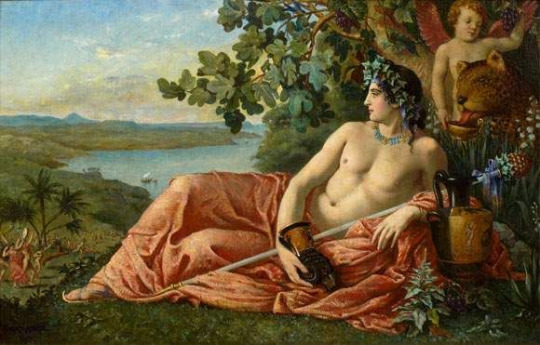
According to the imagery of the Ancient Greeks, Dionysos is supposed to be a young god – he is often depicted as a teenager, sometimes even as a child. This perhaps explains why his Greek name was thought to be the counterpart of the Phrygian “Dioskouros”, “the boy of Zeus”. However, it seems more plausible to link Dionysos’ name to Nysa, both nurse and homeland of the god. But no matter which of these explanations is right: both highlight and insist on a foreign origin for the god. A foreign origin that we know to be purely mythical rather than historical – indeed, the Mycenaean texts proved that the cult of Dionysos was implanted in Greece since a very, very old time, and was not a “recent importation” as classical Greeks believed. But then, why make Dionysos a “foreign god”? Maybe because, in a symbolic way, it is important for Dionysos to be a god that “comes and goes”, a “god that arrived” – or maybe, it was a much needed element to explain his strange, bizarre and frightening character.
I/ Births and rebirths of Dionysos
Semele, a mortal woman loved by Zeus, died because of Hera’s jealousy: she asked her divine lover to appear before her in all of his glory, but this resulted in her death struck by his lightning. Removing the child she was bearing in her womb, Zeus placed the unborn into his own thigh, where the baby completed his growth. As such, Dionysos knew a double-birth, and his cult was deeply marked by this. One of the Dionysiac rites is the ritual of the liknites (child in crib) – where a child has to disappear and be searched by women in vain, for he will only reappear one year later.

The Passion of Dionysos: The myths of Dionysos’ childhoods and wanderings depict him as a persecuted god. One time he is dismembered, boiled and devoured by the Titans before being resurrected by Demeter. Another time Hera curses with madness Semele’s sister, Ino, first nurse of the god. In a third tale pirates kidnap the child to sell him as a slave. Homer, in the Iliad, retells of how Lycurgus, armed with an axe and a desire to kill, hunted down Dionysos and his nymph-nurses – the child had to throw himself into the sea, where he was saved by Thetis. The true “passion” of Dionysos (in the Christian meaning of the term) always suffering, always dying, but always resurrecting, seems to be a symbol of the vegetal cycle. As a result, it is no coincidence that the four great holidays of Dionysos are all placed between the end of December and the beginning of April – aka, between the winter solstice and the arrival of spring.
Ivy and vine: Legends insist on the ties between Dionysos and other vegetal deities, such as Cybele or Rhea – two incarnations of the great Earth-mother, two deities that shield Dionysos from Hera’s revenge. There are the agrarian nymphs that constantly surround the god; there is his lover, Ariadne, that was originally a Minoan goddess of vegetation; and there is of course Demeter, to which he is tied through the Mysteries of Eleusis (and Pindar even goes as far as making Dionysos and Demeter a couple). Dionysos is also called Bacchus (a named which, according to Euripides, comes from “bacchos”, the “branch” the “bough”) ; he is said to be a “ploutodotes”, a “wealth-giver” ; he was believed to give strength to plants and to help them grow ; and among his numerous attributes, his most prominent ones are the ivy (of which he is crowned) and the grapevine (which he offered to the world). These two plants have always a savior role in his myths. It was said that the child Semele bore was protected from the lightning by ivy ; the pirates were frightened when ivy and vine started growing around their ship’s mast ; a nymph hunted by Lycurgus turned herself into vine to choke the murderous king… And yet, these two plants are such a contrast they can only make the god ambiguous: ivy is coldness and sterility, where the grapevine is warmth and generosity. Dionysos is almost most famed as the god of wine: it is the wine that symbolizes the presence of the gods during festivals; during the Lenaia festival (January-February) the new wine is offered to the god (symbolized as a bough-decorated mask). Dionysos “polygethes” (joyful, happy) is said, according to Euripides, to have the power to “laugh and put to sleep all our problems”.
Fertility and fecundity: This god, friend of the nymphs, who found a home with Thetis at the bottom of the sea, whose statue is ritually plunged in water at Halai, who was said to have entered Athens on a naval chariot, has too many affinities with water and humidity (an universal symbol of fertility) for his power to limit itself just to plants. Indeed, let us take a look at his cohorts and parades: w find in there donkeys, goats and bulls, usually painted in an ithyphallic position; and he is surrounded by Satyrs and Silenes whose lubricity and lust are meant to parallel the chastity of the Maenads. Dionysos himself, during the Anthesteria festival (February-march) knows a physical and sexual union with the Basilinna, and by doing so ensures one year of fecundity for all of Athens. The exaltation of fertility in Dionysos’ cult is most expressed through phallophoria – but the particularity of Dionysos is that he depicts a complete and “full” fecundity, with both its masculine and feminine attributes. Dionysos, in his myth like in his cult, is surrounded by women: Aeschylus calls him “effeminate”, explaining his youthfulness (he hasn’t grown a beard or body hair yet), and his clothes (he usually wore the women’s peplum). Some even depict him as an androgynous figure, and the ambiguity of his sex reminds the one of the hermaphrodite and their “ideal fecundity”. The French poet Baudelaire will even interpret the thyrsus, a long, leafed staff held by the followers of the god, as the union of the masculine symbol (the straight staff) and the feminine one (the curvy boughs wrapped around it). Dionysos is “polygethes” and “ploutodotes” – but reducing Dionysos to this sole role would be removing from him his “dark side”, the eviler part of his power. For Homer calls him “mainomenos”, the “demented one”. He is a god that disturbs, he is a god that break the order.
More about this next time, in “The Frenzied God”!
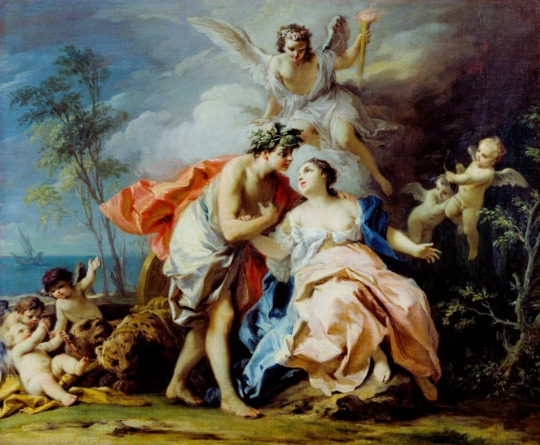
56 notes
·
View notes
Text
The Greek Goddess Legacy Challenge: All Generations
Hi everyone! Since all my generations are posted separately, I thought it would be nice to have a post with links to every goddess. So.. Here it is :)
Gaia, Mother Earth. Primal Goddess of the earth. She who gave birth to all the elements in the world.
Aphrodite, Lady of Cythera. Olympian Goddess of Love, Beauty, Passion, Lust and Desire.
Hera, Queen of Heavens. Olympian Goddess of Marriage and Birth and Queen of the Gods.
Demeter, The Good Goddess. Goddess of Harvest, Agriculture, the Cycle of Life and Law
Persephone, Queen of the Underworld. She who destroys the light, Goddess of Spring, Death, Life and Destruction. Queen of the Underworld
Hecate, Guardian of the Crossroads. Goddess of Witchcraft, the Night, Crossroads, Ghosts and Necromancy.
Athena, The Bird Goddess. Goddess of Wisdom, Courage, Mathematics, Skill, Civilization and Strategic War.
Amphitrite, Queen of the Seas. Goddess and Queen of the Sea
Nemesis, The Inescapable. Goddess of Retribution for Evil deeds, Hubris and Undeserved good Fortune
Nike, Winged Victory. Goddess of Speed, Strength and Victory
Artemis, Protectress of Girls. Goddess of the Hunt, Forests, Hills, Moon, Childbirth and Archery.
Iris, Wondrous One. Goddess of the Rainbow and Messenger of the Olympian Gods
The Greek Goddesses Challenge by LJJ-Sims is a challenge based on the ancient mythical creatures and stories from Greece. I fell in love with Greek mythology in high school and have not let that love go since. In this challenge you will follow 10 deities in their journey through life. Every goddess has a different take on and goal in life. Special about this challenge? All your kids have little challenges of their own, not only your heir. These challenges are optional, so if you feel like these are too much or just too restricting for you: by all means let them go. I also have sheets for characters that you can make before you start each generation. This gives your challenge a lot more personality and makes it frankly easier and more fun!
A little disclaimer: because I made these gods and goddesses into a legacy challenge, the relationships in the myths don’t exactly match the relationship in this challenge. There is a lot of keep it in the family in mythology, to put it lightly. And apart from the fact that you can’t do that in the Sims, I don’t really like that part. So I didn’t include it, thus the inconsistency. An example: Ares is now Hera’s stepfather instead of her son, which she conceived with her brother and husband Zeus. This inconsistency can also be found in the stories. It’s just based on and not copied exactly, as Sims live lives that are a lot shorter than those of immortal gods. And it takes a way from the creativity if we just copy the myths. Even if we wanted to do that, it’s quite hard, as every myths has its fair share of variations and some are just completely different stories.
I use the MCCC-mod to alter the length of life states. You can find the days-years ratio here: the boring stuff.
#sim#sims#maxis match#sims 4#ljjsims#the sims#ljj#sims 4 legacy#the sims 4#greek deities#greek goddess#greek goddesses#greek gods#legacy challenge#sims legacy#ts4 legacy#thegreekgoddesslegacychallenge#greekgoddesslegacychallenge#greek mythology#legacy challege#ts4#ts4 gameplay#my sims#the sims community#greek myths#mythology#hellenic deities#Iris#Gaia#Aphrodite
123 notes
·
View notes
Note
hi hi @sunlit-arrow here✨
First: I'd love a temple to lady artemis 💕
Second: Do you have any reading recs for new devotees? (of Artemis ofc). I am currently reading She Who Hunts by Carla Ionescu. Have you read it?
Third: I’ve been struggling with the meaning behind the myth of Callisto. If you don’t mind me asking, what’s your interpretation?
Sorry for the long ask, I love your blog✨💕
Ah! I am so glad someone else would be interested in something like that! It is currently in progress as we speak! I do have some book recommendations! Artemis by Stephanie Lynn Budin,
The pagan portals Artemis book Awakening Artemis: Deepening Intimacy with the Living Earth and Reclaiming Our Wild Nature by Vanessa Chakour
"Artemis: Virgin Goddess of the Sun & Moon" by Sorita d'Este and David Rankine
"Artemis: The Indomitable Spirit in Everywoman" by Jean Shinoda Bolen
"The Sanctuary of Artemis at Brauron: A Guide" by John Papadimitriou
"The Huntress: Artemis and the Feminine Power of the Wild" by Cait Johnson
"Artemis: The Feminine Divine" by Rachael Patterson
"Goddess Artemis: Mythology and Modern Archetype" by Courtney Roberts
"Artemis: Virgin and Mother in Greek Religion" by Buxton Richard
"The Nature and Worship of Artemis" by Donald E. Strong
"Artemis: Greek Goddess of the Hunt and the Moon" by Teri Temple
"Artemis: The Goddess of the Hunt and the Protector of Animals" by Tammy Gagne
"Artemis: Warrior Goddess and Protectress" by Annie Baring
"Artemis: Goddess of the Wild" by Paul Stephenson
"The Cult of Artemis in the Classical World" by David R. Bean
"The Goddess Artemis" by Laura Perry
"Artemis: Her Story Retold in Modern Context" by Diane Wolfe
"Artemis: The Goddess in Action" by Penelope W. Hunter
"Artemis and Her Cult" by Vinciane Pirenne-Delforge
"Artemis: The Huntress and the Moon Goddess" by Eileen Holland
"The Cult of Artemis at Ephesus" by Guy MacLean Rogers
"Artemis: Insights into the Wild Goddess" by Sarah Burntwood
"The Virgin Huntress: Artemis and Her Worship in Ancient Greece" by Helen Brown
"Artemis: A Guide to the Ancient Goddess of the Hunt and Moon" by Amy Tate
"The Legacy of Artemis: From Ancient Myths to Modern Feminism" by Marianne Moore
"Exploring Artemis: Mythology, Worship, and Legacy" by Christopher Blackwell
"Artemis Unveiled: The Goddess of Wilderness and Protector of Women" by Sophia Kane ( I apologize some of these are woman focused but I have read most of these myself and currently reading number 24) and last but not least Secrets of Artemis by C.K. Brooke I absolutely love the book She Who Hunts by Carla Ionescu and absolutely loved how it covers how widespread her worship was and her origins ! I'd be happy to discuss it with you anytime on here or discord! As for your third question! The Myth of Callisto is very hard to interpret as I have read like three different versions of it and they were all vastly different. But from all I can gather it really just seems to be a big elaborate way of explaining the constellation Ursa Major and Ursa Minor. But I will be writing this down to read again and hopefully be able to write a different interpration on this blog. I will leave this explanation of it below that I just looked up while writing this post and see if maybe you got a different opinion from it too? I'm all about discussion and everyone has a different opinion! http://madelinemiller.com/myth-of-the-week-callisto/ If you have any other questions im always free to answer here or on discord! ( I apologize how long winded this is as well)
#from the forest#artemis#hellenic pagan#hellenic polytheism#hellenic pantheon#hellenic mythology#from the writer#hellenic deities#she who hunts#from the desk
11 notes
·
View notes
Text

Hekate, Keeper of Keys Talon Abraxas
Hekate: Triple-Bodied Greek Goddess of Witchcraft and Keeper of Keys
Hecate the goddess of Greek mythology has been primarily remembered for her associations with magic and witchcraft. Throughout history however, her sphere of influence also included the moon, night, crossroads, boundaries, ghosts and necromancy. Although Hecate was once considered to be a powerful Greek goddess of witchcraft, Hecate was not a major deity when compared, for instance, to the Twelve Olympians.
There are therefore few myths which revolve around this Greek goddess of magic. Nevertheless, the goddess Hecate plays a particularly important role in the Greek myth which relates the abduction of Persephone. It is also from this myth that the quintessential representation of Hecate, as a goddess holding a flaming torch in each hand, is derived.
The Powers of Hecate, the Greek Goddess of Witchcraft
It is generally believed that the goddess Hecate was the daughter of Perses and Asteria, both of whom were from the second generation of Titans. Nevertheless, some have claimed that she was the daughter of Zeus and either Hera or Pheraea. Yet others have stated that she was a daughter either of Leto or of Tartarus.
In any case, it is widely accepted that Hecate the goddess was not originally a member of the Greek pantheon. In fact, her cult is said to have originated in ancient Thrace, or perhaps in Caria, Anatolia. The original worshippers of Hecate believed that the goddess had power over heaven, earth, and the seas, thus making her an incredibly powerful goddess.
Hecate, whose name came from the Greek word hekatos meaning “worker from afar,” had the power not only to bestow upon those she favored wealth, good fortune, and wisdom, but also to withhold these gifts from those she perceived as unworthy. She was honored by all the gods, including Zeus. As she sided with the Olympians during the Titanomachy, she was the only member of the old regime who retained her powers following the defeat of the Titans.
Within ancient Greek religion Hecate had many different roles, as goddess not just of witchcraft, but also of magic, spells, the night, ghosts, light, necromancy, and even the moon. She was also seen as a goddess of oikos, meaning the household and family, and doorways. Some have even connected her to Artemis, who was portrayed in a similar style, with boots, torches and dogs.
Due to her extensive powers, Hecate has been confused and identified with several other deities throughout history. For instance, as a goddess of nature, she was identified with Demeter, whilst as a moon goddess, she has been identified with Persephone.
"I am she that is the natural mother of all things, mistress and governess of all the elements, the initial progeny of worlds, chief of powers divine, Queen of heaven, the principal of the Gods celestial, the light of the goddesses: at my will the planets of the air, the wholesome winds of the Seas, and the silences of hell be disposed; my name, my divinity is adored throughout all the world in divers manners, in variable customs and in many names, [...] Some call me Juno, others Bellona of the Battles, and still others Hecate. Principally the Ethiopians which dwell in the Orient, and the Egyptians which are excellent in all kind of ancient doctrine, and by their proper ceremonies accustomed to worship me, do call me Queen Isis." (Lucius Apuleius in The Golden Ass)
23 notes
·
View notes
Text
How many deities have I written now, how many are just derivatives of older myths, how many are just a deconstruction of real mythology, am I a sham?
No, all myths evolve from older stories, many of these can be traced back to proto myths, some can even be found to have overlapping themes and story arcs.
Hmmm.
Am I a hack, or is this what all who write feel when they borrow from reality? How many gods can I write based off of the Proto-Indo-European mold which all myths are derived?
The sky father, the earth mother, the herdsman, the weather god, the moon and sun gods, a basic outline, rather, a template from which all worldly myths have evolved.
Dyeus Phter, the sky father, father daylight, sky god, the divine personification of the bright sky of the day and the seat of the gods.
The name Dyeus derives from the stem dyeu-, denoting the "diurnal sky" or the "brightness of the day," ultimately from the root di or dei- "to shine, be bright."
In classic Indo-European, associated with the late Khvalynsk culture 4900–3500 BC, Dyēus had the meaning of "Heaven," whereas it denoted "god" in general, or the Sun-god in particular, in the Anatolian tradition.
The suffix-derivative diwyós "divine" is also attested in Latin, Greek and Sanskrit.
The noun deynos "day," interpreted as back-formation of deywós, has descendant cognates in;
Albanian din "break of the day"
Vedic Sanskrit dína- "day" and divé-dive "day by day"
Lithuanian dienà, Latvian dìena "day"
Slavic dъnъ "day" or Poludnitsa "Lady Midday"
Latin Dies, goddess of the day and counterpart to Greek Hemera
Hittite siwat "day"
Palaic Tīyat- "Sun, day"
Ancient Greek endios "midday"
Old Armenian tiw տիւ, "bright day"
Old Irish noenden "nine-day period"
Welsh heddyw "today"
The most constant epithet associated with Dyeus is "father" phter.
The term "Father Dyeus" was inherited in the;
Vedic Dyáuṣ Pitṛ́
Greek Zeus Patēr
Illyrian Dei-pátrous
Roman Jupiter Djous patēr
Even in the form of "dad" or "papa" in the Scythian Papaios for Zeus, or the Palaic expression Tiyaz papaz.
The epithet Phter Genhtor "Father Procreator" is also attested in the Vedic, Iranian, Greek, and the Roman ritual traditions.
I'm going mad, I've written over 400 deities, even the word deity derives from deywos, and dyew, which are also Proto-Indo-European and come from dyeus.

9 notes
·
View notes